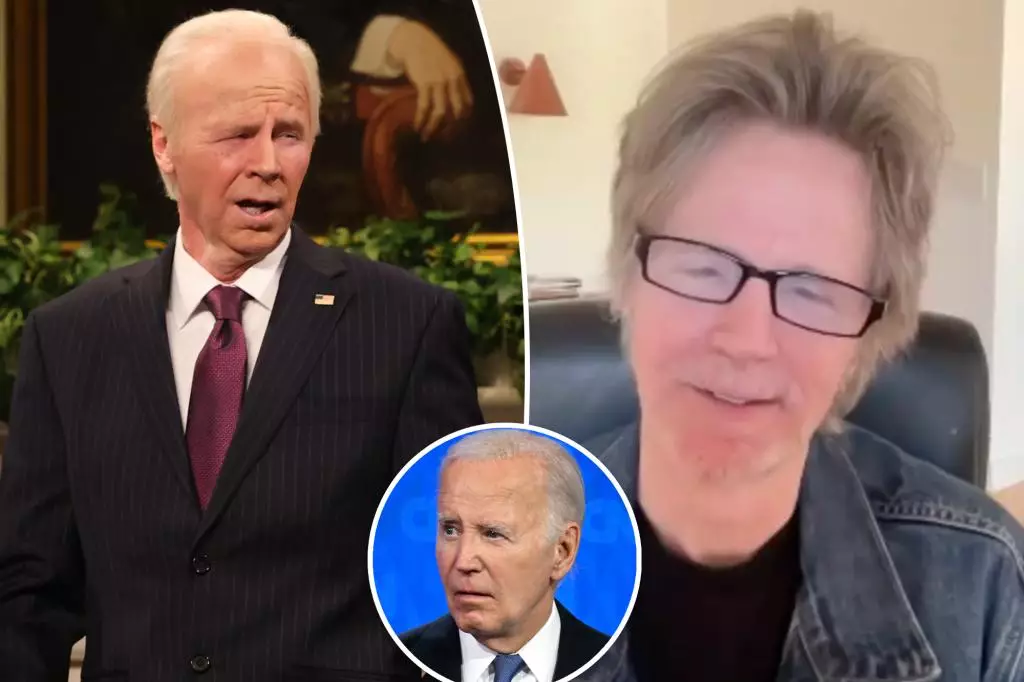Dana Carvey, the beloved comedian and filmmaker, recently found himself back in the limelight with an unexpected return to “Saturday Night Live.” This revival was instigated not just by the show’s enduring legacy, but also by a particularly entertaining impersonation of President Joe Biden. His rekindled connection with SNL’s creative energies, primarily orchestrated by the influential Lorne Michaels, highlights the cyclical nature of comedy and nostalgia in American television. In an exclusive interview, Carvey humorously recounted Michaels’ persuasive invitation to join the cast once more, emphasizing the unique charm of this iconic show and the irreplaceable space it holds in the lives of its performers.
Carvey’s playful recounting of his conversation with Michaels succinctly captures the whimsical essence of SNL. The improvisational spirit of showbiz is unmistakable here, with Michaels’ encouragement signaling a statement about both the exciting unpredictability of the political landscape and the comedic opportunity it presents. In a world where the lines between politics and entertainment are increasingly blurred, Carvey’s presence on the show resonates with viewers seeking laughter amid tumultuous times.
Personal Insights into Political Satire
One of the most striking aspects of Carvey’s impersonation is his intentional approach. He crafts his character not to vilify Biden but to highlight the quirks and idiosyncrasies that make the political world chock-full of comedic potential. His perspective is refreshingly light-hearted—Carvey strives to create humor without crossing into cruelty. This choice illustrates a broader commentary on the nature of satire in modern comedy; rather than merely targeting individuals for ridicule, Carvey aims to explore the comedic nuances that humanize them.
This sensitive approach is not without precedent. Carvey previously carved out a niche for himself by impersonating George H.W. Bush in the early ’90s, a period marked by its own political complexities. The affection that Bush expressed towards Carvey’s portrayals is a testament to the fine line comedians walk between commentary and respect. The warm invitation to the White House reflected a mutual understanding; when comedy disarms, it fosters connection rather than enmity.
Moments of Nostalgia
Carvey’s return to SNL is steeped in nostalgia, both for him and his audience. The emotional resonance of revisiting the show where his career blossomed invites us to reflect on the narratives that have shaped popular culture. The shared memories of iconic sketches and unforgettable moments are woven into the fabric of Carvey’s comedic repertoire. His references to past experiences, including delightful anecdotes about his impersonations of other public figures, enrich this narrative.
Yet, this return is also a reminder of the changing landscape of comedy and politics. Carvey’s self-awareness about being part of a generation of entertainers who shaped political satire underscores the evolution of humor in response to societal changes. The rise of social media, instant news, and a polarized public implies that today’s comedians face an entirely different terrain than those of the past, a realization that enhances Carvey’s ongoing contributions to comedic discourse.
The Joy of Collaboration
The camaraderie that Carvey shares with fellow comedians, including Maya Rudolph and Jim Gaffigan, reflects the spirit of collaboration that has long defined SNL. Working alongside former colleagues and fellow comedians reaffirms the communal nature of comedy. Carvey’s interactions with these talents reveal an underlying philosophy; comedy thrives on collaboration and shared experiences, often leading to the most insightful humor.
In his ongoing podcast with David Spade, Carvey continues to explore the rich tapestry of entertainment with a mix of humor and nostalgia. Their discussions encapsulate the joys and absurdities of the industry while honoring its history. This emphasis on storytelling, shaped by both triumphs and missteps, highlights Carvey’s belief that every comedic instance is interwoven within a larger narrative, one that reflects the dynamic and ever-changing backdrop of American culture.
Carvey’s embodiment of the political stage through lighthearted impersonations serves not just to entertain but to provoke thought about the relationship between humor, politics, and the shared experiences that bond individuals across diverse backgrounds. His journey is a celebration of resilience and joy in a chaotic world, utilizing humor as a thread that stitches together the fabric of society.

